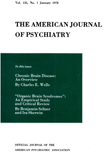PATTERNS OF SOCIAL INTERACTION IN BRAIN DISEASE
Abstract
The phenomena of loss of insight, dulling of consciousness, and loss of inhibition occuring in patients with brain disease are described. These are not explicable solely in terms of a lesion in a particular portion of the brain or as the result of the disruption of a specific neurophysiological mechanism.
These modes of behavior can be more fruitfully considered in terms of altered patterns of social interaction or language, appearing as modes of adaptation to the stress of illness and incapacity. The relationship of brain dysfunction to the premorbid personality and the cultural milieu is discussed.
Access content
To read the fulltext, please use one of the options below to sign in or purchase access.- Personal login
- Institutional Login
- Sign in via OpenAthens
- Register for access
-
Please login/register if you wish to pair your device and check access availability.
Not a subscriber?
PsychiatryOnline subscription options offer access to the DSM-5 library, books, journals, CME, and patient resources. This all-in-one virtual library provides psychiatrists and mental health professionals with key resources for diagnosis, treatment, research, and professional development.
Need more help? PsychiatryOnline Customer Service may be reached by emailing [email protected] or by calling 800-368-5777 (in the U.S.) or 703-907-7322 (outside the U.S.).



